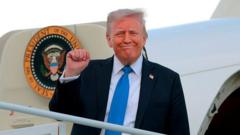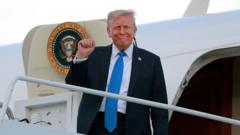Friedrich Merz is set to be sworn in as Germany's new Chancellor, bringing an end to months of political deadlock, while facing challenges from both the economy and the rising far-right.
Germany's Friedrich Merz to Lead New Coalition Government Amid Political Shifts

Germany's Friedrich Merz to Lead New Coalition Government Amid Political Shifts
German parliament set to elect controversial figure as Chancellor, promising economic revitalization
Germany's parliament is preparing to officially appoint Friedrich Merz as the new Chancellor after he signed a coalition deal with the Social Democrats, marking the conclusion of a significant political stalemate. The 69-year-old CDU leader is pledging to rejuvenate Germany’s struggling economy and enhance its global stance. However, he assumes power during turbulent times, amidst an increase in far-right sentiments.
In his inaugural speech following the coalition agreement, Merz affirmed, "It's our historical duty to make this government a success." Supporters within the CDU, including Bundestag member Mark Helfrich, insist there’s a pressing need for responsible governance to tackle rising voter dissatisfaction. The coalition comprising CDU, CSU, and SPD holds a slim majority in the Bundestag with just 328 seats.
Following the February federal election, the CDU/CSU saw only a marginal uptick in support, while their coalition partner SPD experienced a severe decline. Merz's agenda includes stricter immigration policies, significant infrastructure investment, and rekindling connections with key European allies. Early on his tenure, he successfully pushed through a law that allows for defence and security expenditures to bypass strict debt limitations, a decision praised by defense experts.
While advancing Germany's ties with the US remains a priority for Merz, challenges lie ahead. The far-right Alternative für Deutschland (AfD) party, recently designated as extremist by domestic intelligence, will be a formidable opposition force. The AfD's agenda includes controversial policies such as mass deportations and halting arms supplies to Ukraine, leading to renewed debates about its future.
Critics, including former Trump administration officials, have condemned the AfD's classification, which the party is contesting in court. Balancing these relationships will be crucial for Merz, who has made statements urging European independence from the US.
Looking abroad, Merz plans to strengthen ties with Paris and Warsaw, asserting that Germany's collaborative relationships had weakened under previous leadership. Polish MP Agnieszka Pomaska emphasized the need for improved cooperation in defense and military investments, particularly contrasting it with the perceived weaknesses of Olaf Scholz's administration.
As Germany potentially embarks on a new political chapter, analysts are observing how Merz navigates both domestic challenges and international expectations, shedding light on whether his government can indeed reverse the tide of political discontent.
In his inaugural speech following the coalition agreement, Merz affirmed, "It's our historical duty to make this government a success." Supporters within the CDU, including Bundestag member Mark Helfrich, insist there’s a pressing need for responsible governance to tackle rising voter dissatisfaction. The coalition comprising CDU, CSU, and SPD holds a slim majority in the Bundestag with just 328 seats.
Following the February federal election, the CDU/CSU saw only a marginal uptick in support, while their coalition partner SPD experienced a severe decline. Merz's agenda includes stricter immigration policies, significant infrastructure investment, and rekindling connections with key European allies. Early on his tenure, he successfully pushed through a law that allows for defence and security expenditures to bypass strict debt limitations, a decision praised by defense experts.
While advancing Germany's ties with the US remains a priority for Merz, challenges lie ahead. The far-right Alternative für Deutschland (AfD) party, recently designated as extremist by domestic intelligence, will be a formidable opposition force. The AfD's agenda includes controversial policies such as mass deportations and halting arms supplies to Ukraine, leading to renewed debates about its future.
Critics, including former Trump administration officials, have condemned the AfD's classification, which the party is contesting in court. Balancing these relationships will be crucial for Merz, who has made statements urging European independence from the US.
Looking abroad, Merz plans to strengthen ties with Paris and Warsaw, asserting that Germany's collaborative relationships had weakened under previous leadership. Polish MP Agnieszka Pomaska emphasized the need for improved cooperation in defense and military investments, particularly contrasting it with the perceived weaknesses of Olaf Scholz's administration.
As Germany potentially embarks on a new political chapter, analysts are observing how Merz navigates both domestic challenges and international expectations, shedding light on whether his government can indeed reverse the tide of political discontent.



















